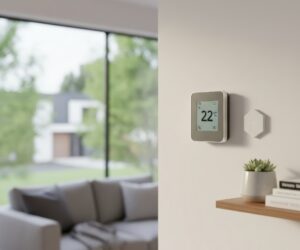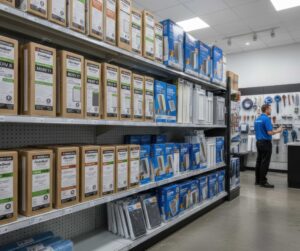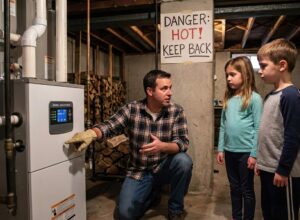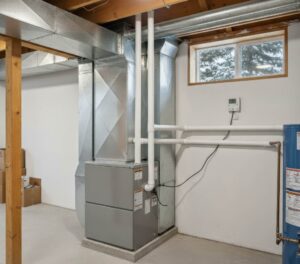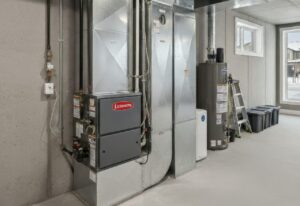As the days get chillier, you might be tempted to crank up your heater. However, using your heat more often can lead to wasted energy and higher energy bills. There are often more efficient solutions to staying warm. Here are some ideas that can help you keep your house warm without using too much energy.
LET THE SUNLIGHT IN
To save on energy, try letting nature’s heater do more of the work. There are several ways you can capture sunlight and use it to heat your house. Start by taking a look at your landscaping. If you have any overhanging branches or overgrown shrubs, trim them back to let more light fall on your house. Make sure to wash your windows every autumn, so caked-on grime doesn’t block sunlight. Finally, remember to open your curtains and blinds during the day. Especially in rooms that get direct sunlight, open windows make your home significantly warmer.
INVEST IN WARMER CLOTHING
One of the most common pieces of advice for saving energy is to put on a sweater instead of turning up the heat. This is definitely a good place to start, but you can get even more benefits by adding other layers. A set of thermal undergarments, thick socks, and a fuzzy sweater can keep you warm without making you run your heat. And remember that people lose a lot of heat through their heads and hands, so a warm hat and a set of gloves will be even more helpful. Once you get into the habit of bundling up, you might find that you barely even use your heater.
USE THICKER CURTAINS AT NIGHT
Open windows might be a great way to stay warm during the day, but at night, it’s another story. Even double-paned windows still are not very insulating. They can end up letting in a lot of chilly air as temperatures drop. A great way to improve insulation is with curtains. The heavy panel of fabric helps to trap cold air and keep it from making the rest of your home chilly. If you aren’t a fan of curtains, there are other insulating window treatments to try. A popular choice is cellular shades, which trap small pockets of air in their honeycomb-shaped cells.
ADD A SPACE HEATER
If you have a large home but spend all your time in one room, don’t pay to heat the whole house. Instead, turn your heater to a much lower temperature and augment the space near you with a small space heater. Just keep in mind that space heaters are not as energy efficient as central heaters. If you want to heat a large space, you’re better off just running your heat. Space heaters will only save you energy if you are just running one at a time.
INSTALL A SMART THERMOSTAT
A common rule of thumb for energy conservation is turning off your heater when you sleep or go to work. However, it can be tricky to constantly adjust your thermostat settings. Smart thermostats are a simple and affordable solution to this problem. These helpful fixtures automatically adjust your heat. You can stop the heat running when you are away from home or warm under the covers. Thermostats can even start warming up your home before you get there, so you don’t encounter any chilly temperatures.
MAKE YOUR HOME MORE AIRTIGHT
Most homes have tiny gaps that let a lot of cold winter air into the house. You can conserve heat by blocking up these holes and making your home more air-tight. There are a lot of different ways to winterize your home. For tiny cracks around window frames or baseboards, caulk or expanding insulation foam works well. If you want to insulate something that still needs to move, try weatherstripping. This material fits around doors and windows to block any gaps. If you are unsure about whether or not your home is airtight, try using tissue paper to check for drafts. Hold a piece in the air and see if it moves. This can help you locate even minuscule air leaks.
CHANGE YOUR CEILING FAN ROTATION
If you have ceiling fans, take a close look at the top of the fan. Most fans have a switch that lets you switch the rotation of the fan. This can be very helpful for circulating air better. When your fan rotates clockwise, it grabs the warm air that pools at the top of the room and pushes it downwards. This ensures the warm air from your heater actually ends up where you will feel it.
GET YOUR HEATER SERVICED
There are all sorts of minor issues, like dirty coils, that can keep your heater from running properly. Though you might not notice any obvious issues, your heater can end up having to run longer to achieve the same results. Regular maintenance service ensures your heater is functioning optimally. During a maintenance visit, the HVAC technician will clean your system, tighten your fittings, and let you know if any major repairs need to be done. Getting service right before the cold season starts will help prepare your system for its busiest time of the year.
MAKE THE MOST OF SHOWERS AND COOKED MEALS
Don’t forget that there are other sources of heat in your home besides your heater. Every time you run a bath or turn on the stove, you are adding heat to your indoor air. Since you have to use energy for these tasks anyways, you might as well make the most of them and heat your home. After a hot bath, leave the water in the tub to add some warmth and ambient moisture to your air. Make sure you keep the door open as well so the steam from your shower moves through your home. In the kitchen, try to plan meals that involve simmering pots of soup and other longer cooking methods. After baking, leave your oven door open to let more heat into the kitchen.
INSTALL AN ENERGY-EFFICIENT HEATING SYSTEM
If your heater needs replacement, be sure to pay attention to energy efficiency while you shop. Modern heaters tend to be far more energy-efficient than their predecessors. Check the item’s tag to see its SEER or AFUE rating. A higher number indicates that the heater will conserve more energy. You can also improve efficiency by looking at less traditional models. A geothermal heat pump is a type of heater that moves heat from below the ground into your home, so it can save a lot of power. Another option is a mini-split system that lets you only heat rooms you are currently using.
To get your heater working as efficiently as possible, turn to Alberta Mountain Air Heating and Air Conditioning. Our team is happy to provide maintenance for all types of heaters in Calgary. We can also help you out with things like heater installations, heater repairs, and air conditioning services. Give us a call now to learn more about how we can improve your home’s HVAC.
